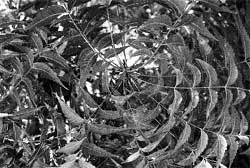Marking neem
 agricultural scientists at the Central Research Institute for Dryland Agriculture (crida), Hyderabad, have identified neem clones which yield a substantial amount of the chemical azadirachtin, used as a biocide and in health care products.
agricultural scientists at the Central Research Institute for Dryland Agriculture (crida), Hyderabad, have identified neem clones which yield a substantial amount of the chemical azadirachtin, used as a biocide and in health care products.
Scientists were looking for seeds with azadirachtin content higher than 0.4-0.8 per cent. Neem (Azadirachta indica) is a cross-pollinated species, and the progeny may not have the characters of the parent tree, including yield of azadirachtin. Vegetative propagation by grafting has a low success rate. So tissue culture is the only answer. This is what B Venkateswarlu, senior scientist at crida, and his team achieved after five years of research. Azadirachtin can now be produced by raising plantations of the clones and micropropagation technology, according to Venkateswarlu.
The team identified and developed four neem clones with required characteristics like faster maturation, high yield of seed and quality wood. The parameters for identifying and selecting the clones were tree form, oil content, and yield of azadirachtin. This means that growers will now have a menu to choose desired characteristics according to their needs.
The team has also standardised tissue culture technique. The nutrients required for tissue culture vary from species to species. With a standardised formula, the process can be repeated on a commercial scale and the clones successfully propagated. Some farmers, ngos and a few private firms have already been supplied with the clonal sapling.
The findings have great commer-cial potential. India has an estimated 14 million neem trees producing 5 lakh tonnes of seed annually, of which one lakh tonne is utilised by the oil and soap industry. About 20-30 per cent of the rest remains unutilised due to inaccessibility of trees. Azadirachtin can contribute about 10 per cent of the value of pesticides used in India, says Venkateswarlu.
Neem plantations in India are restricted to village homesteads and farmlands. Organised plantations are rare. Using the tissue culture technique, a large number of seeds would be available for agroforestry.
However, plantations raised from a single elite neem clone would be vulnerable to attack by insects which become resistant to azadirachtin, Venkateswarlu warns. Multiclonal neem plantations and cultivation with other timber species would prevent this happening in the near future.
